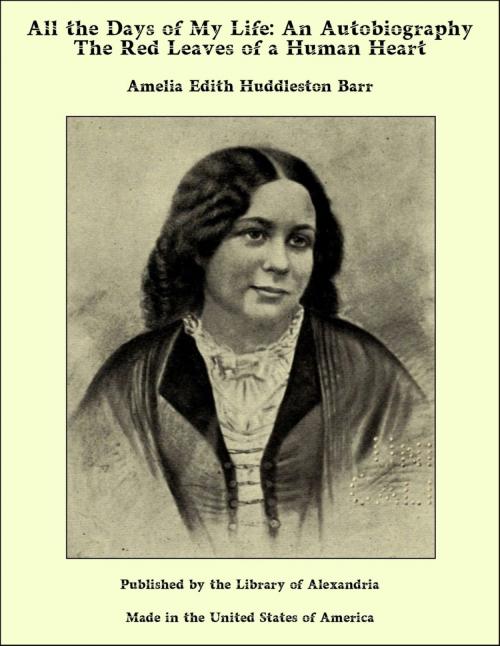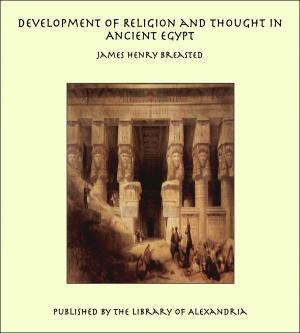All the Days of My Life: An Autobiography The Red Leaves of a Human Heart
Nonfiction, Religion & Spirituality, New Age, History, Fiction & Literature| Author: | Amelia Edith Huddleston Barr | ISBN: | 9781465615619 |
| Publisher: | Library of Alexandria | Publication: | March 8, 2015 |
| Imprint: | Language: | English |
| Author: | Amelia Edith Huddleston Barr |
| ISBN: | 9781465615619 |
| Publisher: | Library of Alexandria |
| Publication: | March 8, 2015 |
| Imprint: | |
| Language: | English |
I entered this incarnation on March the twenty-ninth, A.D. 1831, at the ancient town of Ulverston, Lancashire, England. My soul came with me. This is not always the case. Every observing mother of a large family knows that the period of spiritual possession varies. For days, even weeks, the child may be entirely of the flesh, and then suddenly, in the twinkling of an eye, the mystery of the indwelling spirit is accomplished. This miracle comes not by observation; no mother ever saw it take place. She only knows that at one moment her child was ignorant of her; that at the next moment it was consciously smiling into her face, and that then, with an instinctive gladness, she called to the whole household, “the baby has begun to notice.” I brought my soul with me—an eager soul, impatient for the loves and joys, the struggles and triumphs of the dear, unforgotten world. No doubt it had been aware of the earthly tabernacle which was being prepared for its home, and its helper in the new onward effort; and was waiting for the moment which would make them companions. The beautifully fashioned little body was already dear, and the wise soul would not suffer it to run the risks of a house left empty and unguarded. Some accident might mar its beauty, or cripple its powers, or still more baneful, some alien soul might usurp the tenement, and therefore never be able effectually to control, or righteously use it. I was a very fortunate child, for I was “possessed by a good spirit, yea rather being good, my spirit came into a body undefiled and perfect” (Wisdom of Solomon, 8:20). Also, my environments were fair and favorable; for my parents, though not rich, were in the possession of an income sufficient for the modest comforts and refinements they desired. My father was the son of Captain John Henry Huddleston, who was lost on some unknown sea, with all who sailed in his company. His brother, Captain Thomas Henry Huddleston, had a similar fate. His ship, The Great Harry, carrying home troops from America, was dashed to pieces on the Scarlet Rocks, just outside Castletown, the capital of the Isle of Man. When the storm had subsided the bodies of the Captain and his son Henry were found clasped in each other’s arms, and they were buried together in Kirk Malew churchyard. During the years 1843 and 1844 I was living in Castletown, and frequently visited the large grave with its upright stone, on which was carved the story of the tragedy. Fifteen years ago my sister Alethia went purposely to Castletown to have the lettering on this stone cleared, and made readable; and I suppose that it stands there today, near the wall of the inclosure, on the left-hand side, not far from the main entrance.
I entered this incarnation on March the twenty-ninth, A.D. 1831, at the ancient town of Ulverston, Lancashire, England. My soul came with me. This is not always the case. Every observing mother of a large family knows that the period of spiritual possession varies. For days, even weeks, the child may be entirely of the flesh, and then suddenly, in the twinkling of an eye, the mystery of the indwelling spirit is accomplished. This miracle comes not by observation; no mother ever saw it take place. She only knows that at one moment her child was ignorant of her; that at the next moment it was consciously smiling into her face, and that then, with an instinctive gladness, she called to the whole household, “the baby has begun to notice.” I brought my soul with me—an eager soul, impatient for the loves and joys, the struggles and triumphs of the dear, unforgotten world. No doubt it had been aware of the earthly tabernacle which was being prepared for its home, and its helper in the new onward effort; and was waiting for the moment which would make them companions. The beautifully fashioned little body was already dear, and the wise soul would not suffer it to run the risks of a house left empty and unguarded. Some accident might mar its beauty, or cripple its powers, or still more baneful, some alien soul might usurp the tenement, and therefore never be able effectually to control, or righteously use it. I was a very fortunate child, for I was “possessed by a good spirit, yea rather being good, my spirit came into a body undefiled and perfect” (Wisdom of Solomon, 8:20). Also, my environments were fair and favorable; for my parents, though not rich, were in the possession of an income sufficient for the modest comforts and refinements they desired. My father was the son of Captain John Henry Huddleston, who was lost on some unknown sea, with all who sailed in his company. His brother, Captain Thomas Henry Huddleston, had a similar fate. His ship, The Great Harry, carrying home troops from America, was dashed to pieces on the Scarlet Rocks, just outside Castletown, the capital of the Isle of Man. When the storm had subsided the bodies of the Captain and his son Henry were found clasped in each other’s arms, and they were buried together in Kirk Malew churchyard. During the years 1843 and 1844 I was living in Castletown, and frequently visited the large grave with its upright stone, on which was carved the story of the tragedy. Fifteen years ago my sister Alethia went purposely to Castletown to have the lettering on this stone cleared, and made readable; and I suppose that it stands there today, near the wall of the inclosure, on the left-hand side, not far from the main entrance.















